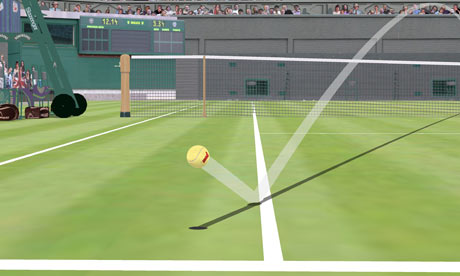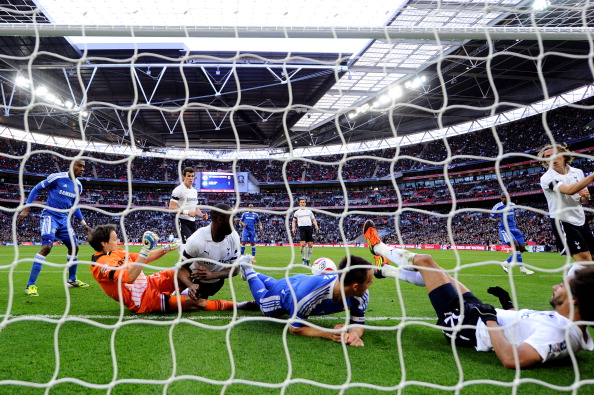Last Sunday the merits of video technology in sport were there for all to see as Roger Federer swept his way to equalling Pete Sampras’ Wimbledon record of seven titles at the expense of Andy Murray. Two players, both with three challenges during each set of a tennis game, with an extra one in the event of a tie-break.
To football fans watching, it must have begged the question, “Why can we not do this in football?”
A pertinent question perhaps, in the light of the decision, finally, to allow goal-line technology in the game by the International Football Association Board (IFAB), FIFA’s lawmakers. But there is a perfectly good reason why we have probably gone far enough with technology in football now. When Federer or Murray challenged the decision of the umpire yesterday, there was a conclusive answer as to whether the ball was either in or out of the court.
Football though, is not comparable. The only clear cut decision like this is whether the ball has crossed the line or not. That is why goal-line technology was always a good idea. However, imagine if one team decide to appeal the referee’s decision to give a penalty or not during a World Cup final. Any football fan will know that most decisions that take place on the field of play can be interpreted a number of different ways. They are almost always subjective.
In tennis (pictured below) on the other hand, the decision is not subjective. The umpire does not interpret whether or not the ball has gone in or out. It either has gone in or out – there are no grey areas. In football on the other hand, the referee has to decide whether, for example when a player is fouled by the last defender, whether he had a clear goalscoring opportunity before the offence.
That is not a black and white decision. One person may say yes, another no. Every week numerous decisions are made which, even for the viewer, cannot be decisively said to be correct or incorrect after several viewings. Add in a video replay to this situation every time a team believes they are unjustly penalised and this will probably cause more anger, rather than less.

A perfect example of this is the issue of diving, a major sin for which video technology has been touted as an antidote. It annoys most, but is extremely difficult to prove. Often if a player goes to ground without being touched he is accused of diving. Even to a non-scientist like myself though, it is quite obvious that the laws of gravity dictate that it is indeed possible to fall to the floor whilst walking, let alone running, without being touched. So how video technology is meant to help prove whether a player is thinking of diving or is simply clumsy, neither I nor probably anyone else can know.
The key point is that technology should be introduced with caution and intelligence. Allowing replays to determine whether a player’s hand touching the ball is a case of “ball to hand” or “hand to ball” is asking for trouble; the arguments both ways would escalate, not dissipate. On the other hand, the offside law could be a case that could be determined with video replays. It could be quickly and decisively proven whether a player is in front of the last defender when the ball is played, though the issue of whether a player is interfering with play or not at any one time is again, subjective.
Last season highlighted the folly of not having goal-line technology. A goal which never went close to going over the line was given to Chelsea against Tottenham Hotspur in the FA Cup semi-final (pictured below). It was a blatant tragedy of injustice which should never have happened. In the subsequent final Liverpool had a header from Andy Carroll not given, and for anyone watching at home, even after three or four replays it was unclear whether the ball was in or not. In Italy Sulley Muntari had a header incorrectly ruled to have not crossed the line ruled out for AC Milan against Juventus, which could have resulted in a very different end result in the Italian championship. Carlos Vela had a similarly valid goal not given whilst playing for Real Sociedad.

Although it is wonderful these issues can now hopefully be consigned to the past, as long as it is not in a Champions League game, for every ghost goal, there will be a number of inconclusive, impossible to prove cases for which technology can only cause more problems, not fewer. In the same FA Cup semi-final that Tottenham were so justifiably angered by the award of a non-existent goal, there was another key decision which technology would not have helped. Gareth Bale took the ball past Petr Cech and was hauled to the ground, only for Emmanuel Adebayor to slide the ball in. What is the referee to do here? In the event he gave the goal rather than issuing Cech a red card and awarding Tottenham a penalty, something many of their fans may actually have preferred. But how would a replay have helped? Chelsea would have used a replay to argue that giving the goal was the fair solution, Tottenham that they should have a penalty and Cech sent off. Either can be interpreted as correct.
Sure it may help the referee to have a second view. But even in such situations, it is surely illogical to bring technology into the sport – if it cannot conclusively solve the dispute, it is likely to only make it worse. Referees are castigated now for their errors, imagine the vitriol for one who has actually seen a replay and made a decision one team disagrees with. In such situations, video technology would be used as a new and dangerous tool to beat the referee with, but it is vital that his authority is not eroded for the good of the sport. It may be frustrating, but football is an imperfect sport, because its rules are so vague compared to others. If we’re looking for anyone to blame for the endless controversies which cannot be adequately resolved, it should be the group of people who wrote the rules in the first place – ie ourselves, the English.
David Gold is a reporter for insideworldfootball.

